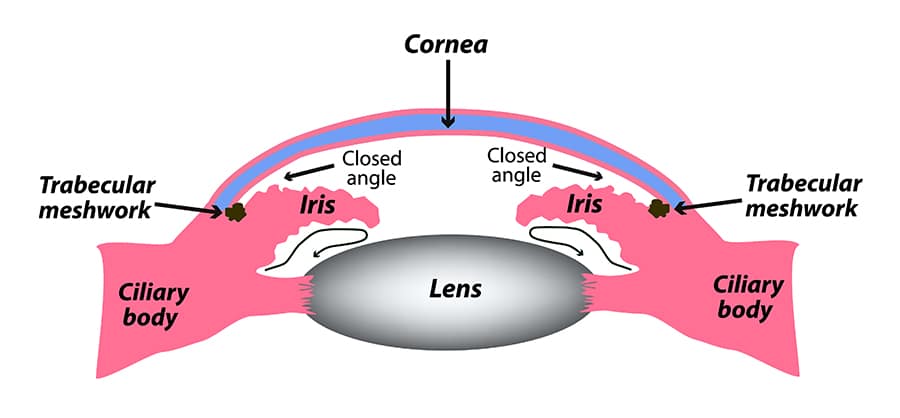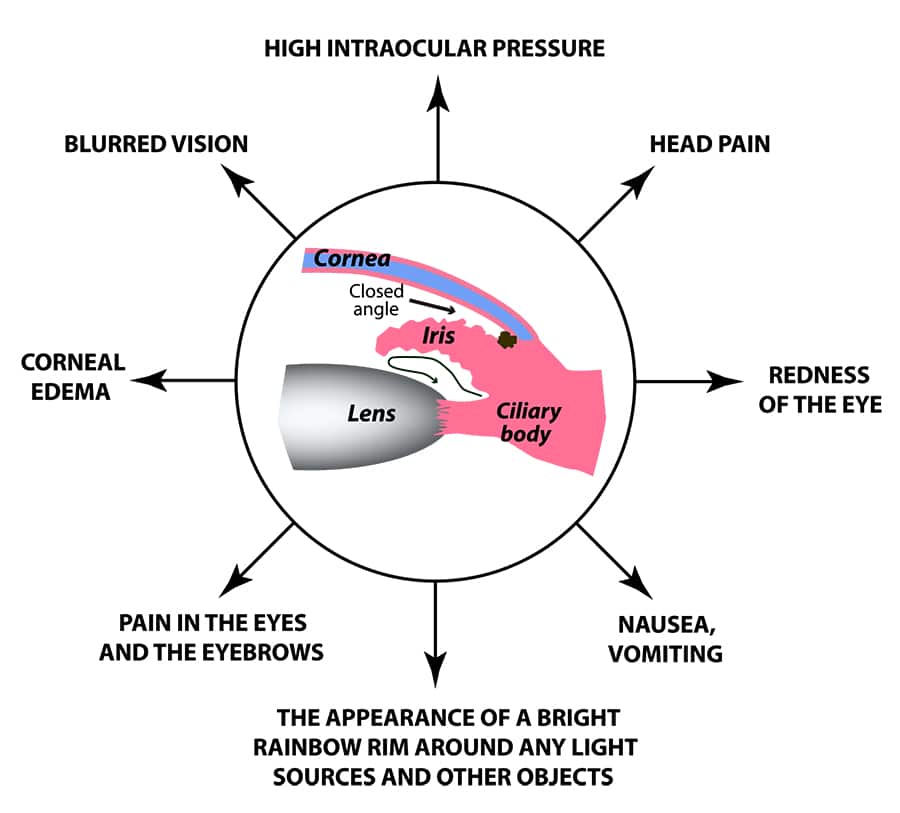About Closed Angle Glaucoma

Some people have eyes that are formed with the iris too close to the drainage angle. In these eyes, which are often small and farsighted, the iris can be pushed forward, which blocks the drainage channel. When this occurs, the fluid is unable to exit the eye which causes pressure inside to build rapidly and cause an acute closed-angle attack.
What causes Closed Angle Glaucoma?
Unlike open-angle glaucoma, which develops slowly, the closed-angle form can happen quite quickly, within a matter of hours. The pressure inside the eye, your intraocular pressure, rises suddenly because the fluid in the eye cannot drain properly.
In both forms of glaucoma, the drainage out of the eye is impaired. Fluids drain out of the eye through the trabecular meshwork, and when you have glaucoma you have developed a blockage or other damage to the meshwork, keeping the fluid in the eye and raising the pressure inside the eye. This increased pressure can damage the optic nerve causing permanent vision damage.
In close-angle glaucoma, the iris (the colored portion of your eye that surrounds the pupil) and the cornea move closer together, and this “closes the angle” between them. If this happens suddenly, this is known as “acute” closed-angle glaucoma. This is an acute attack, and it can be very painful. When acute angle closure glaucoma completely blocks the trabecular meshwork canals, the pressure builds up in the eye and can cause complete loss of vision if not treated quickly.
Some people are more prone to acute attacks because they have narrow drainage systems. If their eye dilates (where the pupil widens in darker lighting) too much or too quickly, this can lead to an acute attack.
The causes of this type of quick dilation occur when a person:
- Suddenly enters a dark room
- Gets drops that dilate their eyes
- Is excited or stressed
- Takes certain drugs such as antidepressants, cold medications, or antihistamines
Some health conditions also can cause closed-angle glaucoma:
- Cataracts
- Ectopic lens (where your lens moves from where it should be)
- Diabetic retinopathy
- Ocular ischemia (narrowed blood vessels to the eye)
- Uveitis (eye inflammation)
- Tumors
Women are 2 to 4 times more likely to develop closed-angle glaucoma than men. Having a sibling or parent with this form of glaucoma raises your risk for developing it. It is also more prevalent in Asian or Inuit populations, in farsighted people, and in those between the ages of 55 and 65.
Symptoms of Closed Angle Glaucoma
Symptoms may include:
- Blurred vision
- Severe eye pain
- Rainbow-colored halos around lights
- Headache
- Nausea and vomiting
It is important to note that this is a true eye emergency. If you experience any of these symptoms, call your ophthalmologist immediately. If this type of glaucoma is not treated quickly, blindness can result.
Two-thirds of those with this type of glaucoma develop it slowly, without any symptoms prior to an attack.

Who Is At Risk For Closed Angle Glaucoma?
You have a higher risk for developing closed-angle glaucoma if you:
- Are older than 40, especially if you’re between 55 and 65 years old
- Are farsighted
- Are female
- Have a sibling or parent with the disease
- Are of Asian or Alaska Native origin
How is closed angle glaucoma treated?
The first thing your Eye Care Institute doctor will do to treat closed-angle glaucoma is to lower the pressure in your eye. To do this, we may use drops that narrow your pupil or medication that lowers the amount of fluid your eye produces.
These are various medications we may use:
- Acetazolamide, which reduces the fluid in your eye
- Beta blockers, which lower the amount of fluid your eye produces
- Steroids, which reduce inflammation
- Painkillers, for comfort
- Drugs, as treatment for nausea and vomiting
- Pilocarpine, which opens the angle between your iris and cornea
Once we get your intraocular pressure down, it’s likely we’ll need to perform surgery to address drainage problems with closed-angle glaucoma. There are three different procedures:
- Peripheral Iridotomy — This is a laser treatment where we create tiny drainage holes in your iris. This is effective for both acute and chronic closed-angle glaucoma.
- Surgical Iridectomy — This procedure is less common. It involves making a small triangular opening in the iris.
- Laser Iridoplasty — Also called gonioplasty, this surgery pulls the edges of your iris away from your drainage canals.
Even if your acute attack is in only one eye, we will likely treat both eyes as a preventive measure.
Will closed angle glaucoma resolve on its own?
This isn’t something to even consider, as the risk of permanent damage to your vision is too high. Because narrowed drainage passages can become fully closed with certain dilation situations, there’s no way you can wait this out to see what happens. If you have the symptoms described on this page, we need to see you immediately at Eye Care Institute.
Can I go blind if my closed angle glaucoma goes untreated?
If left untreated both open-angle and closed-angle glaucoma will eventually lead to an increasing loss of vision and eventual blindness in the affected eye. Unlike open-angle glaucoma, which progresses quite slowly, an acute closed-angle attach can raise intraocular pressure within a few hours. This is an emergency situation.
What should I do if I have closed angle glaucoma?
If you have a family history of closed-angle glaucoma, you absolutely need to have your eyes checked regularly. That way our team at Eye Care Institute can keep tabs on your eye drainage. In some cases, we may recommend iridotomies to help prevent an attack if you’re at high risk for closed-angle glaucoma.
This is another reason you need to maintain your schedule of regular eye exams after you pass the age of 40.
What People Say About Us!
"Very friendly and efficient. I arrived early to fill out the paperwork right after I started filling in the paperwork, I was called in where my eye examination began. I felt the exam was very thorough and was happy that I went to the Eye Care Institute. I will go back. They were very respectful of your time. I was in and out in under and hour."
Click here to read more reviews.
Schedule a Closed Angle Glaucoma Consultation Today!
If you wish to learn more about Closed Angle Glaucoma, or if you wish to determine whether you are a candidate for treatment, be sure to contact the Eye Care Institute today and book a personalized appointment with one of our accomplished eye doctors. Call 707.546.9800 to speak with our staff, or fill out the form in our contact page. Our practice has office in Santa Rosa.